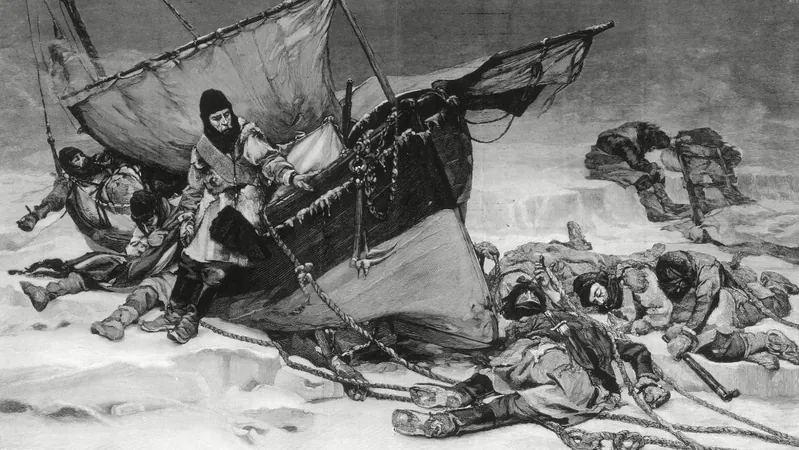
Shocking Discovery Unveils Cannibalism Among Crew of Lost Arctic Expedition
2024-10-11
Author: Emily
Discovery of Cannibalism Among 19th-century Arctic Expedition Crew
In a remarkable development, archaeologists have identified the cannibalized remains of James Fitzjames, a senior officer from a doomed 19th-century Arctic expedition. This revelation throws a harrowing light on the tragic and desperate circumstances faced by the crew of the HMS Erebus and HMS Terror, which were lost during an ill-fated attempt to navigate the treacherous Northwest Passage.
Fitzjames' Identity Confirmed Through DNA Analysis
After a thorough DNA analysis comparing the remains with a living descendant, Fitzjames' identity has been confirmed. He was part of a Royal Navy voyage commanded by Sir John Franklin, aiming to explore previously uncharted regions of the Canadian Arctic Archipelago. Tragically, the voyage met its demise in April 1848, three years post-departure from England, following the deaths of Franklin and 23 crew members.
The Agonizing Decline of the Expedition
The expedition, once boasting 129 members, witnessed an agonizing decline as the surviving crew members attempted to trek across ice and land in hopes of survival. Fitzjames, along with 105 other survivors, abandoned their ice-trapped ships and started a desperate retreat that ultimately cost them their lives. Doug Stenton, an archaeologist involved in the study, remarked, "It went horribly wrong, horribly quickly," alluding to the swift collapse of their hopes for survival.
Historical Accounts and Evidence of Cannibalism
In a shocking twist, historical accounts from Inuit communities noted incidents of cannibalism among the crew members. Initially dismissed in England, these reports were later corroborated by discoveries of bones with cut marks indicative of such acts of desperation. The recent study, published in the Journal of Archaeological Science, focused on remains found at a site on King William Island, where Fitzjames' bones were excavated in 1993.
The Personal Impact of Identifying Fitzjames
This discovery adds a deeply personal note to an already tragic narrative. Anthropologist Claire Warrior articulated the emotional impact of identifying Fitzjames, noting, "This is a person who had a life and family and whose words we have." Fitzjames, once known for his enthusiasm and humor, now becomes a symbol of the perilous journey undertaken by his crew.
Circumstances of Fitzjames' Death
Researchers located Fitzjames' remains approximately 80 kilometers south of Victory Point, where the crew sought refuge after abandoning their ships. DNA analysis revealed that he likely died only weeks after departing from that point, and initial findings suggest he may have been in failing health.
A Descendant's Connection to History
In a poignant connection to history, Nigel Gambier, a direct descendant of Fitzjames, contributed his DNA for analysis, feeling a personal stake in uncovering his ancestor's fate. He remarked that the effort to understand the expedition's events has been rewarding and harrowing, especially given the grim realities the crew faced.
Significance of the Findings
Fitzjames is the second confirmed member of the expedition identified through DNA evidence. The first was the chief engineer, John Gregory, but unlike Fitzjames, his remains showed no signs of cannibalism. Stenton and his colleagues discovered that at least three other men from the confirmed dead crew exhibited similar signs of having been cannibalized.
Challenging Historical Understanding
The implications of this discovery challenge our understanding of social status during life-threatening scenarios. The identification of a high-ranking officer like Fitzjames as a victim of cannibalism underscores the extreme desperation faced as the crew struggled for survival.
Future Research Directions
Warrior suggested that further DNA testing could provide insights into the ages and identities of the remaining unidentified remains, potentially shedding light on how they met their demise.
Cultural Legacy of the Expedition
The lost expedition, often romanticized in literature and media, including the acclaimed television series "The Terror," continues to captivate the imagination. The tragic reality of their fate reminds us of the harshness of polar explorations, where the unforgiving forces of nature can lead even the most prepared to unimaginable acts of desperation. The search for answers about the fate of Franklin's expedition may be complex, but each discovery adds vital pieces to this historical puzzle.









 Brasil (PT)
Brasil (PT)
 Canada (EN)
Canada (EN)
 Chile (ES)
Chile (ES)
 España (ES)
España (ES)
 France (FR)
France (FR)
 Hong Kong (EN)
Hong Kong (EN)
 Italia (IT)
Italia (IT)
 日本 (JA)
日本 (JA)
 Magyarország (HU)
Magyarország (HU)
 Norge (NO)
Norge (NO)
 Polska (PL)
Polska (PL)
 Schweiz (DE)
Schweiz (DE)
 Singapore (EN)
Singapore (EN)
 Sverige (SV)
Sverige (SV)
 Suomi (FI)
Suomi (FI)
 Türkiye (TR)
Türkiye (TR)